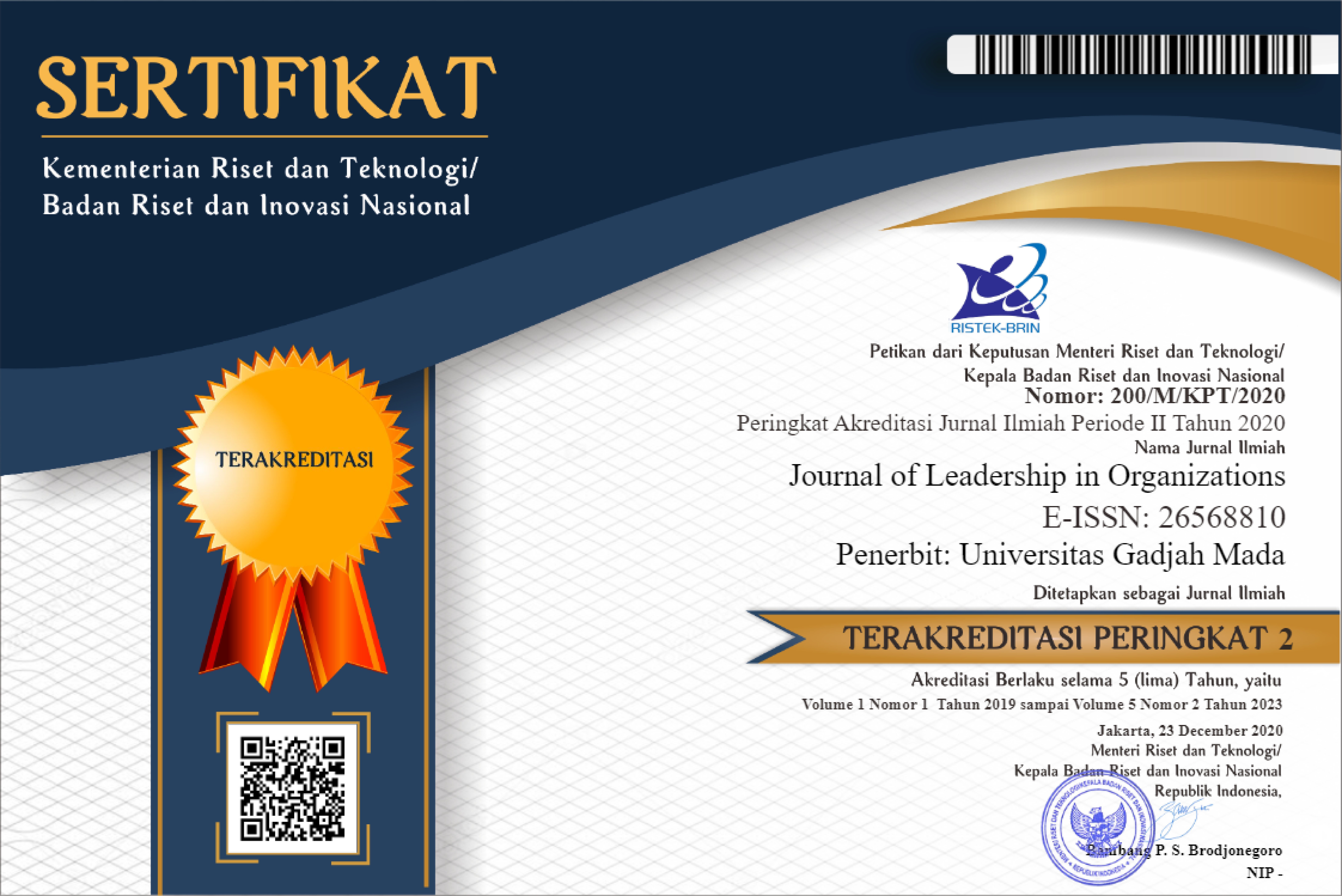KIAI INTERPERSONAL MANAGERIAL: HENRY MINTZBERG PERSPECTIVE
Abdul Karim(1*), Dikhorir Afnan(2)
(1) Universitas Muhammadiyah Cirebon
(2) Universitas Muhammadiyah Cirebon
(*) Corresponding Author
Abstract
Keywords
Full Text:
PDFReferences
Abawi, K. (2013). Data Collection Instruments (Questionnaire & Interview). Training in Sexual and Reproductive Health Research Geneva, 1(Geneva Workshop 2013), 18. Retrieved from http://www.gfmer.ch/SRH-Course-2012/Geneva-Workshop/pdf/Data-collection-instruments-Abawi-2013.pdf
Ahammad, T. (2018). Personnel management to human resource management (HRM): How HRM functions? Journal of Modern Accounting and Auditing, 13(9), 412–420. https://doi.org/10.17265/1548-6583/2017.09.004
Antonakis, J., & House, R. J. (2014). Instrumental leadership: Measurement and extension of transformational–transactional leadership theory. The Leadership Quarterly, 25(4), 746–771. https://doi.org/https://doi.org/10.1016/j.leaqua.2014.04.005
Bafadal, I. (2003). Manajemen Peningkatan Mutu Sekolah Dasar. Jakarta, Indonesia: Ibrahim Bafadal Press.
Dinh, J. E., Lord, R. G., Gardner, W. L., Meuser, J. D., Liden, R. C., & Hu, J. (2014). Leadership theory and research in the new millennium: Current theoretical trends and changing perspectives. The Leadership Quarterly, 25(1), 36–62. https://doi.org/10.1016/j.leaqua.2013.11.005
Engkoswara. (2010). Administrasi Pendidikan. Bandung, Indonesia: Alfabeta.
Ernest Dale. (1965). Management; Theory and Practice. Mcgraw – Hill: Book Company.
Freebody, P. (2004). Qualitative Research in Education: Interaction and Practice. London: Sage Publications.
Gifford, W. A., Squires, J. E., Angus, D. E., Ashley, L. A., Brosseau, L., Craik, J. M., … Wazni, L. (2018). Managerial leadership for research use in nursing and allied health care professions : a systematic review, 1–23.
Handoko, T. H. (1995). Manajemen: Edisi Kedua. Yogyakarta, Indonesia: BPFE-Yogyakarta.
Heale, R., Forbes, D., & Heale, R. (2013). Understanding triangulation in research, 0(0), 101494.
Hidayat, T. (2011). Korelasi Gaya Kepemimpinan dan Kompetensi Kepala Madrasah dengan Pengelolaan Madrasah Tsanawiyah se-Kota Cirebon. IAIN Syeh Nurjati.
Karim, A. (2011). Peran kepemimpinan kyai dan koperasi pondok pesantren (Kopontren) dalam pembentukan jiwa kemandirian dan entrepreneurship santri di pondok pesantren Al-Ishlah Bobos Cirebon. Program Pascasarjana Institut Islam Negeri (IAIN) Syekh Nurjati Cirebon. Retrieved from https://www.semanticscholar.org/paper/PERAN-KEPEMIMPINAN-KYAIDAN-KOPERASI-PONDOK-JIWA-Karim/bc177a44a105068b7fbd47ea1db278d28907fdc3
Karim, A. (2012). Manajemen Rasa & Syahwat. Cirebon, Indonesia: Hirahpress.
Karim, A. (2016a). Managerial inspriation in the traditional pesantren. UMRAN - International Journal of Islamic and Civilizational Studies (EISSN: 2289-8204), 3(3–1), 73–84. https://doi.org/10.11113/umran2016.3n3-1.150
Karim, A. (2016b). Pembaharuan pendidikan Islam multikulturalis. Jurnal Pendidikan Agama Islam -Ta’lim, 14(1), 19–35. Retrieved from http://jurnal.upi.edu/taklim/view/3880/pembaharuan-pendidikan-islam-multikulturalis-.html
Karim, A., Faiz, A., Parhan, M., Gumelar, A., Kurniawaty, I., Gunawan, I., … Suanah, A. (2020). Managerial leadership in green living pharmacy activities for the development of students’ environmental care in elementary schools. Journal of Critical Reviews, 7(13), 714–719. Retrieved from http://www.jcreview.com/?mno=119121
Karim, A., & Hartati, W. (2020). Spiritual tasks of teachers in higher order thinking skills-oriented learning. International Journal of Psychosocial Rehabilitation, 24(8), 4568–4580. https://doi.org/10.37200/IJPR/V24I8/PR280474
Karim, A., Mardhotillah, N. F., & Samadi, M. I. (2019). Ethical leadership transforms into ethnic: Exploring new leaders’s style of Indonesia. Journal of Leadership in Organizations, 1(2), 146–157. https://doi.org/https://doi.org/10.22146/jlo.44625
Karim, A., Purnomo, H., Fikriyah, F., & Kardiyati, E. N. (2020). A charismatic relationship: How a Kyai’s charismatic leadership and society’s compliance are constructed? Journal of Indonesian Economy and Business, 35(2), 129–143. https://doi.org/https://doi.org/10.22146/jieb.54705
Khan, M., & Shaheen, A. (2016). The leadership role of secondary school principals and its impact on students’ academic achievement.pdf. FWU Journal of Social Science, 10(1), 75–80.
Lensufiie, T. (2010). Leadership Untuk Profesional dan Mahasiswa. Jakarta: Erlangga Group.
Manullang, M. (1992). Dasar-Dasar Manajemen: Cetakan Ke-13. Jakarta, Indonesia: Ghalia Indonesia.
Mason, J. (2002). Qualitative Researching (2nd Editio). London: Sage Publications.
Miles, M. B., & Huberman, A. M. (1994). Qualitative Data Analysis: An Expanded Sourcebook (2nd ed.). London New Delhi: Sage, Thousand Oaks Publications Sage.
Mintzberg, H. (1975a). The manager’s Job: Folklore and Fact. Harvard Business Review, (53), 49–61.
Mintzberg, H. (1975b). The Manager’s Job: Folklore and Fact. Harvard Business Review, (53), 59–61.
Mintzberg, H. (1975c). The Manager’s Job Folklore and Fact. Harvard Business Review, Vol. 53, 49–61. Retrieved from www.hbr.org
Minztberg, H. (1973). The Nature of Managerial Work. New York, USA: Harper & Row.
Moleong, L. J. (2007). Qualitative Research Methods. Bandung, Indonesia: PT Youth Rosdakarya.
Muhtarom. (2005). Reproduksi Ulama di era globalisasi. Yogyakarta, Indonesia: Pustaka Pelajar.
Mulyasa, E. (n.d.). Kepala Sekolah Profesional. Bandung, Indonesia: PT Remaja Rosdakarya.
Mulyasa, E. (2009). Manajemen Berbasis Sekolah. Bandung, Indonesia: PT. Remaja Rosdakarya.
Näsman, Y. (2018). The theory of caritative leadership applied to education. International Journal of Leadership in Education, 21(4), 518–529. https://doi.org/10.1080/13603124.2017.1349183
Nassaji, H. (2015). Qualitative and descriptive research: Data type versus data analysis. Language Teaching Research, 19(2), 129–132. https://doi.org/10.1177/1362168815572747
Nikezić, S., Doljanica, S., & Bataveljić, D. (2013). Charismatic and Transformational Leadership: Approaches for Effecting. Annals of the Oradea University, 9(2), 179–187. Retrieved from http://imtuoradea.ro/auo.fmte/files-2013-v2/NikezicS2-IMT-Oradea-2013.pdf
Oberhuber, S., & Maurer, I. (2015). Quantitative Data Analysis. Text durch Klicken hinzufügen.
Oyugi, M., & Gogo, J. O. (2019). Influence of principals’ leadership styles on students’ academic performance in secondary schools in Awendo sub-county, Kenya. African Educational Research Journal, 7(1), 22–28. https://doi.org/10.30918/AERJ.71.18.096
Purwanto, N. (1999). Administrasi dan Supervisi Pendidikan. Bandung, Indonesia: PT Remaja Rosda Karya.
Puskur, T. (1994). Landasan Program dan Pengembang Kurikulum. Jakarta, Indonesia: Depdikbud.
Qomar, M. (2007). Manajemen Pendidikan Islam. Jakarta, Indonesia: Erlangga.
R.Terry, G. (1960). The Principles of Management (Third Edit). Homewood Illinois: Richard Irwin.
Rost, J. C. (1993). Leadership for Twenty-Fist Century. Westport: CN, Praeger.
Sa’ud, U. S., & Makmun, A. S. (2007). Perencanaan Pendidikan, Suatu Pendekatan Komprehensif. Bandung, Indonesia: PT. Remaja Rosda Karya.
Schenker, T. (2017). Fostering foreign language skills through an extracurricular drama project. Language Learning Journal. https://doi.org/10.1080/09571736.2017.1406532
Sugiono. (2006). Metode Penelitian Bisnis, Cetakan ketujuh. Bandung, Indonesia: Penerbit CV. Alvabeta.
Sukardji, K. (2000). Manajemen Pendidikan Pada Madrasah Aliyah Dan Peranannya Dalam Pencapaian Tujuan Pendidikan Nasional: Studi Pada Empat Madrasah Aliyah Negeri Di Dki Jakarta. UIN Syarif Hidayatullah.
Sukarna. (1992). Dasar-Dasar Manajemen. Bandung, Indonesia: Mandar Maju.
Terry, G. (1968). Principles of Management. Illinois: Ricard D. Irwin.
Terry, G. R. (1977). Principles of Management: Third Edition. The University of California: Richard Irwin Publisher.
Uhl-Bien, M., Riggio, R. E., Lowe, K. B., & Carsten, M. K. (2014). Followership theory: A review and research agenda. The Leadership Quarterly, 25(1), 83–104. https://doi.org/https://doi.org/10.1016/j.leaqua.2013.11.007
Wahyuni, S., & Hidayat, N. (n.d.). Hubungan antara Komunikasi Interpersonal Kepala Sekolah dan Peran Manajerial Kepala Sekolah dengan Kepuasan Kerja Guru.
Winardi J. (2003). Entrepreneur & entrepreneurship. Jakarta, Indonesia: Prenada Media Group.
Winarti, E. (2018). Perencanaan manajemen sumber daya manusia lembaga pendidikan. Jurnal Tarbiatuna, 3(1), 1–26.
Yin, R. K. (2015). Case Study Research Design and Methods (5th ed.). (Sage, Ed.). file:///C:/Users/DELL/Downloads/30-1-108.pdf: Thousand Oaks, CA. https://doi.org/10.3138/cjpe.30.1.108
Yukl, G. A. (1998). Kepemimpinan dalam Organisasi. (J. U. (penerjemah), Ed.) (edisi bhs.). Jakarta, Indonesia: Prenhallindo.
Zarkasyi, I. (1996). Dari Gontor merintis Pesantren Modern. Ponorogo: Gontor Press.
Article Metrics
Refbacks
- There are currently no refbacks.
Copyright (c) 2020 Journal of Leadership in Organizations

This work is licensed under a Creative Commons Attribution-ShareAlike 4.0 International License.
| Journal of Leadership in Organizations |
| Journal of Leadership in Organizations (JLO), with registered number ISSN 2656-8829 (Print) and ISSN 2656-8810 (Online), is published by the Center for Leadership Studies, Department of Management, Faculty of Economics and Business, Universitas Gadjah Mada. The content of this website is licensed under a Creative Commons Attribution-ShareAlike 4.0 International License |
| © 2019 Journal of Leadership in Organizations | |





_logo2.png)


.png)




